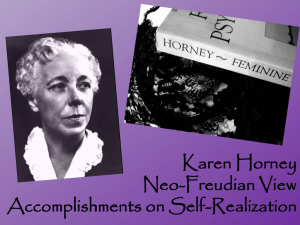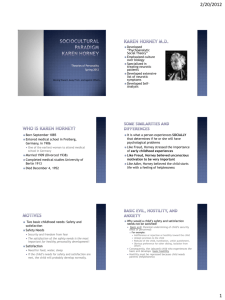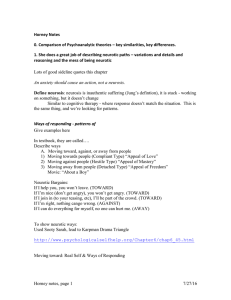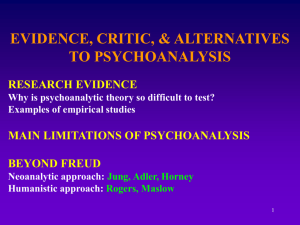Karen Horney notes
advertisement
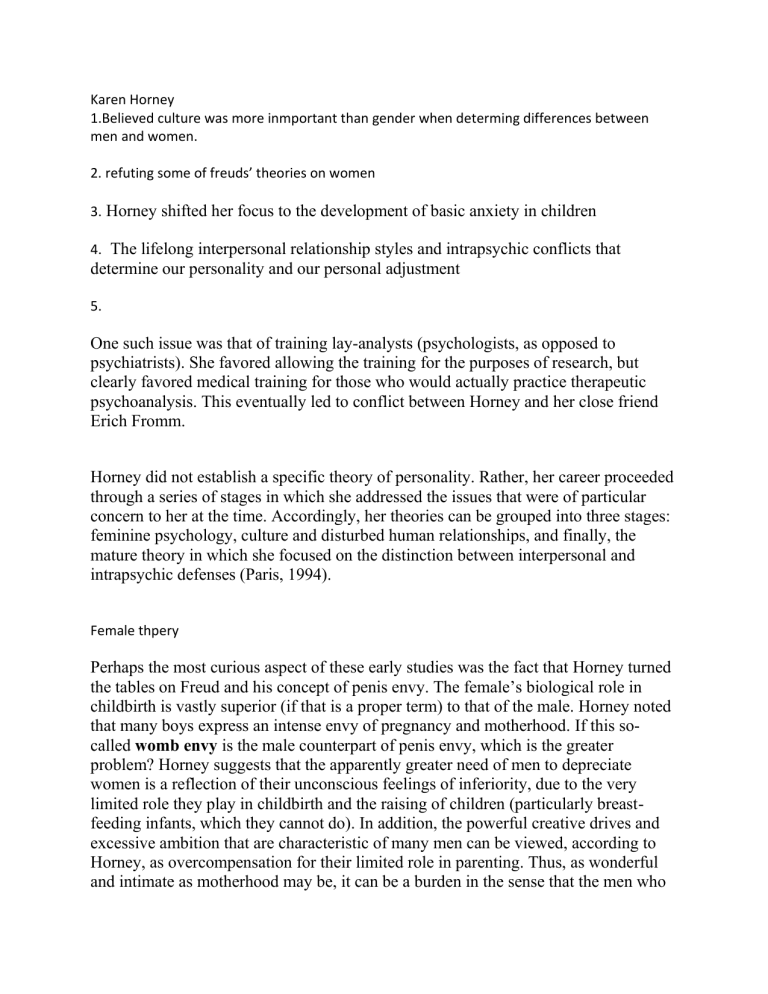
Karen Horney 1.Believed culture was more inmportant than gender when determing differences between men and women. 2. refuting some of freuds’ theories on women 3. Horney shifted her focus to the development of basic anxiety in children 4. The lifelong interpersonal relationship styles and intrapsychic conflicts that determine our personality and our personal adjustment 5. One such issue was that of training lay-analysts (psychologists, as opposed to psychiatrists). She favored allowing the training for the purposes of research, but clearly favored medical training for those who would actually practice therapeutic psychoanalysis. This eventually led to conflict between Horney and her close friend Erich Fromm. Horney did not establish a specific theory of personality. Rather, her career proceeded through a series of stages in which she addressed the issues that were of particular concern to her at the time. Accordingly, her theories can be grouped into three stages: feminine psychology, culture and disturbed human relationships, and finally, the mature theory in which she focused on the distinction between interpersonal and intrapsychic defenses (Paris, 1994). Female thpery Perhaps the most curious aspect of these early studies was the fact that Horney turned the tables on Freud and his concept of penis envy. The female’s biological role in childbirth is vastly superior (if that is a proper term) to that of the male. Horney noted that many boys express an intense envy of pregnancy and motherhood. If this socalled womb envy is the male counterpart of penis envy, which is the greater problem? Horney suggests that the apparently greater need of men to depreciate women is a reflection of their unconscious feelings of inferiority, due to the very limited role they play in childbirth and the raising of children (particularly breastfeeding infants, which they cannot do). In addition, the powerful creative drives and excessive ambition that are characteristic of many men can be viewed, according to Horney, as overcompensation for their limited role in parenting. Thus, as wonderful and intimate as motherhood may be, it can be a burden in the sense that the men who dominate society have turned it against women. This is, of course, an illogical state of affairs, since the children being born and raised by women are also the children of the very men who then feel inferior and psychologically threatened. In a later paper, Horney (1932/1967) carried these ideas a step further. She suggested that, during the Oedipus stage, boys naturally judge the size of their penis as inadequate sexually with regard to their mother. They dread this inadequacy, which leads to anxiety and fear of rejection. This proves to be quite frustrating, and in accordance with the frustration-aggression hypothesis, the boy becomes angry and aggressive toward his mother. For men who are unable to overcome this issue, their adult sexual life becomes an ongoing effort to conquer and possess as many women as possible (a narcissistic overcompensation for their feelings of inadequacy). Unfortunately, according to Horney, these men become very upset with any woman who then expects a long-term or meaningful relationship, since that would require him to then prove his manhood in other, non-sexual ways. For women, one of the most significant problems that results from these development processes is a desperate need to be in a relationship with a man, which Horney addressed in two of her last papers on feminine psychology: The Overvaluation of Love(1934/1967) and The Neurotic Need for Love (1937/1967). She recognized in many of her patients an obsession with having a relationship with a man, so much so that all other aspects of life seem unimportant. While others had considered this an inherent characteristic of women, Horney insisted that characteristics such as this overvaluation of love always include a significant portion of tradition and culture. Thus, it is not an inherent need in women, but one that has accompanied the patriarchal society’s demeaning of women, leading to low self-esteem that can only be overcome within society by becoming a wife and mother. Indeed, Horney found that many women suffer an intense fear of not being normal. Unfortunately, as noted above, the men these women are seeking relationships with are themselves seeking to avoid long-term relationships (due to their own insecurities). This results in an intense and destructive attitude of rivalry between women (at least, those women caught up in this neurotic need for love). When a woman loses a man to another woman, which may happen again and again, the situation can lead to depression, permanent feelings of insecurity with regard to feminine self-esteem, and profound anger toward other women. If these feelings are repressed, and remain primarily unconscious, the effect is that the woman searches within her own personality for answers to her failure to maintain the coveted relationship with a man. She may feel shame, believe that she is ugly, or imagine that she has some physical defect. Horney described the potential intensity of these feelings as “self-tormenting.” Anxiety Horney believed that anxiety was a natural state of all living things, something the German philosophers had called Angst der Kreatur(anxiety of the creature), a feeling that one is helpless against such forces as illness, old age, and death. We first experience this anxiety as infants, and it remains with us throughout life. It does not, however, lead to neurotic anxiety. But if a child is not cared for, if their anxiety is not alleviated by the protection of their parents, the child may develop basic anxiety: The condition that is fostered…is an insidiously increasing, all-pervading feeling of being lonely and helpless in a hostile world…This attitude as such does not constitute a neurosis but it is the nutritive soil out of which a definite neurosis may develop at any time. (pg. 89; Horney, 1937) THE NEEDS OF CHILDHOOD 1. Satisfaction and safety 2. If unfulfilled hostility emerges 3. Hostility is repressed due to helplessness, fear of parents, lave and guilty feelings BASIC ANXIETY 1. Means of protecting against anxiety are: gaining affection, being submissive, attaining power, and withdrawing. 2. increasing, all pervading feeling of being lonely and helpless in a hostile world NEUROTIC TREND 1. Movement toward people (compliant personality) 2. Movement against people (aggressive personality) 3. Movement away from people (Detached Personality) IDEALIZED SELF-IMAGE 1. Non-neurotic: Realistic appraisal of ones abilities and goals 2. Neurotic unrealistic and misleading appraisal of ones abilities Strengths of her theories 1. Valuable way to categorize deviant behavior 2. Personality researchers accept my view on personality development 3. My notion of basic anxiety is similar to Erickson’s concept. Limitations of her theories 1. My denial of some of freuds theory were obvious weaknesses ( reduced emphasis on sexuality) 2. My personality theory is not completely developed as Freud’s 3. Not precisely detail how social forces shape personality 1. basic evil - all of the negative factors that can provoke insecurity in a child 2. womb envy -men and boys are jealous of woman's ability to bear and nurse children 3. hypercompetitive - desire to compete and win in order to keep or heighten beliefs that one is worthy 4. attachment theory - way to understand tendency for some people to bond to specific others and to account for the distress that may follow separation or loss secure, avoidant, resistant attachment styles 5. 6. Erich Fromm 1. lay-analyst with a Ph.D 2. focused even more than Horney on social influences, particularly one’s relationship with society itself. 3. the two were intimately involved for a number of years loneliness & isolation - As our freedom has increased, so has our loneliness & isolation 3 psychic mechanisms For escaping from negative aspects of freedom 1.Authoritarianism 2.Destructiveness 3.Automaton conformity Authoritarianism A psychic mechanism for regaining security -Manifested in either masochistic or sadistic strivings -Masochistic -strong need for dependence on other people -Sadistic -strive for power over others Destructiveness A psychic mechanism for regaining security -Displayed in a desire to eliminate objects, persons, & institutions which are perceived as threatening Automaton conformity A psychic mechanism for regaining security -Involves an unconditional obedience to the prevailing rules that govern behavior -Individual becomes a robot -does what society expects of them -A false identity -must always be in a "conforming" mode to hold up one's image PARENT AND CHILD Proposed 3 forms of interpersonal relatedness between parent & child 1.symbolic relatedness 2.withdrawal - destructiveness 3.love symbolic relatedness -Children remain close to & dependent on their parents -Never achieve independence, -Escape their loneliness & insecurity by becoming part of someone else either by "swallowing" or by being "swallowed" by other person withdrawal - destructiveness -Children distance themselves from parents -Which form child takes depends on parents behavior -Parents who act destructively will cause child to withdraw love -A form of parent-child interaction in which parents provide respect & a balance between security & responsibility -Most desirable form -Child feels little need to escape growing freedom & is able to love self as well as others In pre-freedom a person is conscious of himself only as a member of community, race, party, corporation, etc. In this case, the person's action is not based on self realization, self identification, and so on. In other words, the person is still related to the world by primary ties. He/she does not yet conceive of him/herself as an individual except through the medium of his/her social role. freedom It showed that freedom from the traditional bonds of medieval society, though giving the individual a new feeling of independence, at the same time made him feel alone and isolated, filled him with doubt and anxiety, and drove him into new submission and into a compulsive and irrational activity and that man can be free and yet not alone, critical and yet not filled with doubts, independent and yet an integral part of mankind. This freedom man can attain by the realization of his self, by being himself. Positive freedom is identical with the full realization of the individual’s potentialities, together with his ability to live actively and spontaneously” similarities Both Horney and Fromm can be seen as extending Adler’s emphasis on social interest and cooperation (or the lack thereof), and their belief that individuals pursue safety and security to overcome their anxiety is similar to Adler’s concept of striving for superiority. like Karen Horney & Alfred Adler he was very interested in social & cultural influences on personality development Wrote much about the human condition
![[W]e should stop bothering about what is femininity are artificial standards….](http://s2.studylib.net/store/data/017925294_1-d7e3172e034664a55ceb291cff98a5d0-300x300.png)

